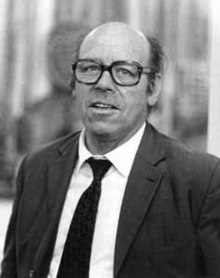Wolfgang Paul
| Wolfgang Paul | |
|---|---|
 |
|
| Born |
10 August 1913 Lorenzkirch, Saxony, German Empire |
| Died | 7 December 1993 (aged 80) Bonn, North Rhine-Westphalia, Germany |
| Nationality | Germany |
| Fields | Physics |
| Institutions |
University of Bonn University of Kiel |
| Alma mater |
Technical University of Munich Technical University of Berlin University of Göttingen |
| Doctoral advisor | Hans Kopfermann |
| Known for | Ion traps |
| Notable awards | Nobel Prize in physics (1989) Dirac Medal (1992) |
| Notes | |
|
He humorously referred to Wolfgang Pauli as his "imaginary part".
|
|
Wolfgang Paul (10 August 1913 – 7 December 1993) was a German physicist, who co-developed the non-magnetic quadrupole mass filter which laid the foundation for what is now called an ion trap. He shared one-half of the Nobel Prize in Physics in 1989 for this work with Hans Georg Dehmelt; the other half of the Prize in that year was awarded to Norman Foster Ramsey, Jr.
Wolfgang Paul was born on 10 August 1913 in Lorenzkirch, Germany. He grew up in Munich where his father was a professor of pharmaceutical chemistry. After the first few years at the Technical University of Munich, he changed to the Technical University of Berlin in 1934 where he finished his Diploma in 1937 at the group of Hans Geiger. He followed his doctorate adviser Hans Kopfermann to the University of Kiel and after being drafted to the air force he finished his PhD in 1940 at the Technical University of Berlin.
During World War II, he researched isotope separation, which is necessary to produce fissionable material for use in making nuclear weapons.
For several years he was a private lecturer at the University of Göttingen with Hans Kopfermann. He became a professor of Experimental Physics at the University of Bonn and stayed there from 1952 until 1993. For two years from 1965 to 1967 he was director of the Division of Nuclear Physics at CERN.
...
Wikipedia
